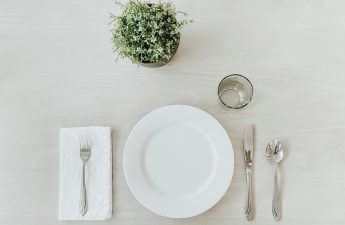
A new year brings with it opportunity for growth, change—and a fresh batch of eating trends. Fortunately, one growing trend* in 2020 is a non-restrictive method of eating: the “non-diet diet.” While fad diets and “Lose X Pounds in Just X Days!” schemes aren’t going away any time soon, they are beginning to lose steam.
There’s no one official definition of the non-diet, but part of the concept involves shifting from rigid rules and learning to pay more attention to fullness and hunger cues. This allows us to slowly cultivate a healthier relationship with food. Of course, this is by no means easy, as many of us are battling with decades of diet culture and the idea of “good” and “bad” foods. At TOPS, we encourage members to think beyond what they’re eating and focus a little more on the why and how. Chapter Four of the TOPS lifestyle book, Real Life: The Hands-on Pounds-off Guide, takes a deep dive into mindful eating with practical tips and guidance. Journaling your mood along with food is one simple way to gain a better understanding of whether or not certain situations or emotions are triggering cravings. For example, if you’re typically exhausted and famished at the end of the work day, plan one weekday to prepare a few simple meals for the week that you can easily grab, heat and eat.
A non-diet approach also moves beyond the number on the scale and factors in non-scale victories, like reaching a fitness goal or keeping a food journal. After a depressing encounter with the scale this morning, I personally find non-scale victories to be a more motivating way to stay (or get back on) track. Find something big or small that motivates you, and remember that it’s different for everyone.
If you’re looking for a more mindful way to approach healthier eating, rather than cutting out specific food groups or only eating at certain times of day, for example—then the non-diet diet may be right for you. Does this latest trend sound good to you, or do you prefer something with more structure? Let me know in the comments!



I tend to go towards the structure. But this might be something to look into incorporating into my daily items.
I like a variety of different plans, that way I can incorporate them into my family meals with out them knowing what I’m doing.
This article is right on point. We spend so much time trying to figure out what to have and what not to have we end up frustrated. The problem lies in when we tell ourselves that we can’t have something the child in use has a temper tantrum and we want it even more. So a non diet diet is the best answer. Now if it was only so easy to get out of our own heads as it is to decide to join TOPS and have the best support group I could find.
I believe most of us know what we need to do, but being mindful and being kind to ourselves is what many of us are lacking thank you for posting is there anyway I can print this to share with our Chapter?
I do believe in the non diet diet, this is my 3rd time as a KOPS first 2 times I followed a strict food and exercise regiment but couldn’t keep it up so lost my status after 2 years, the 3rd time I chose to eat healthy and in moderation, still tracked my foods and did some exercise, but now I’m mindful of what I’m eating, guess you could call this a diet but to me it’s a lifestyle change. Will be 7 yrs this August for my 3rd time KOPS and have never gone over goal. It’s not about being thin, it’s about being healthy
Love this article – mindful eating so important – purpose in choices we make – taking food and excerise to a new level by body response rather than a written food plan and a gym . I’m hoping to see you at IRD this summer again
My husband and I joined TOPS last April. We have both been successful in our weight loss journey unlike other programs we have tried throughout the years. We have not dieted. We have become more mindful eaters, increased activity, and enjoy weekly meetings with our TOPS family.
I’ve been a KOPS for 17 years non-stop, I walk 6 days a week around my neighborhood with a friend. Keep tabs on my weight in my date book daily & try to make good food choices. I have been under goal 3 weeks at weigh-ins a month at TOPS in 11 of 12 months in 2019 & I aim for achieving this goal 12 out of 12 months in 2020! Healthy is the name of the game. I follow my particular diet.
I think the non diet lifestyle would be too much freedom for me. If l don’t track, follow the program and pay close attention to what goes into my mouth, l won’t lose or even maintain.
I enjoyed this article but,I like to keep in mind of my calorie intake and be mindful of what I am eating. Taking time to really savour the taste and realizing I am satisfied instead of feeling full is another factor to keep in mind.
I’m 78 years old. I’v been a member for 25 years I’v lost 40 lbs. and and at 180 I seem to yo yo. I just can’t seem to stop extra bits. I’v just started not eating after 2:00 pm till morning.
I’m surprised at making a rule of not eating after 2 has been easier than I thought. I have slip up only 2 small bits. I have been having a good breakfast and balance lunch with all the foods I need for the day. I have been losing slow but the edema in my left side is so much better. It’s seems when I eat even health foods I seem to take another helping or snacking never satisfied or have a signal to just stop. I;m going to keep on this not eating after 2. I have a doctor appointment in a few weeks .Just thinking I wish I could have done this sooner. I wounder if that is how a alcoholic feels? I don;t drink or smoke my parents did enough of that.